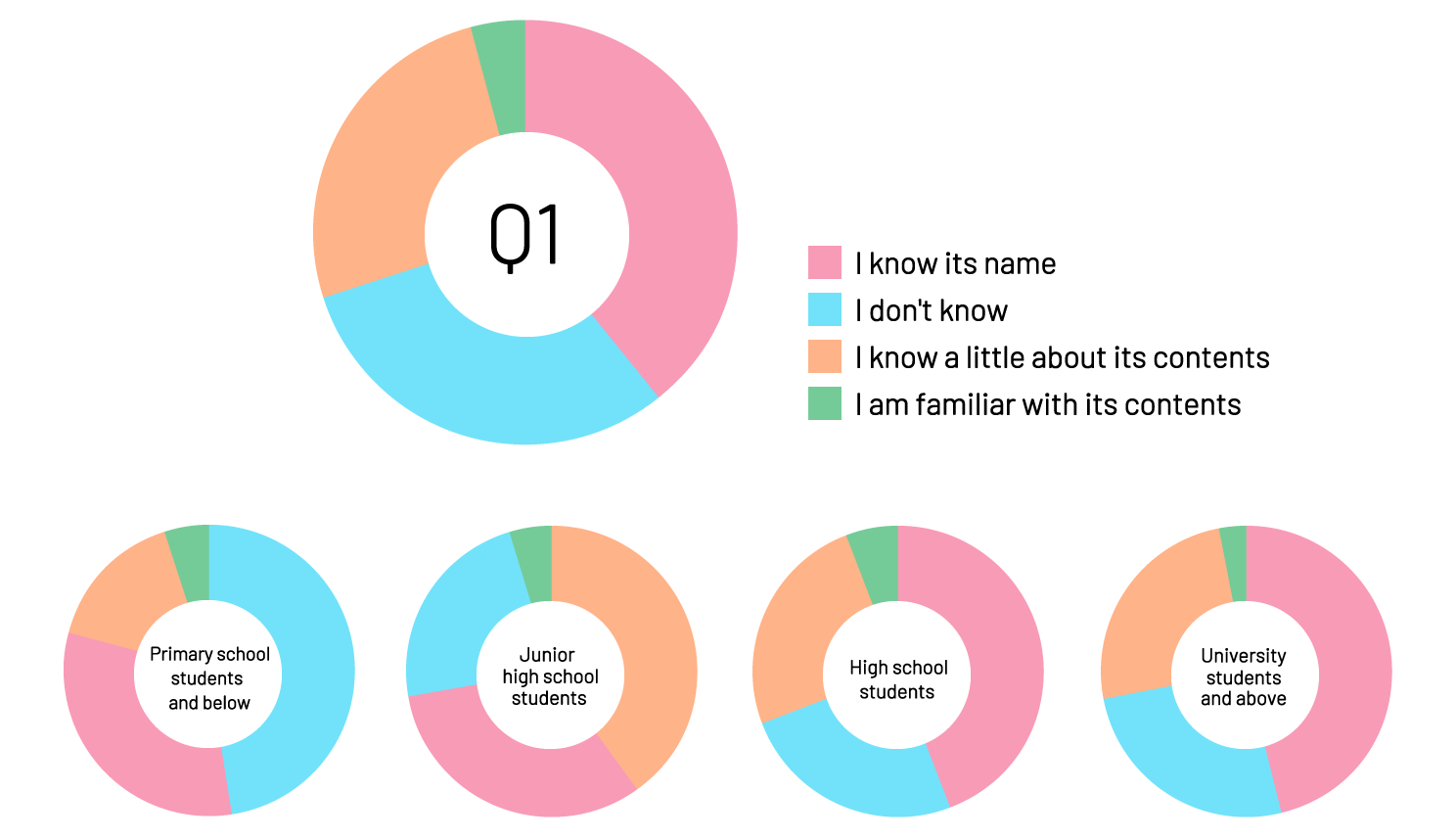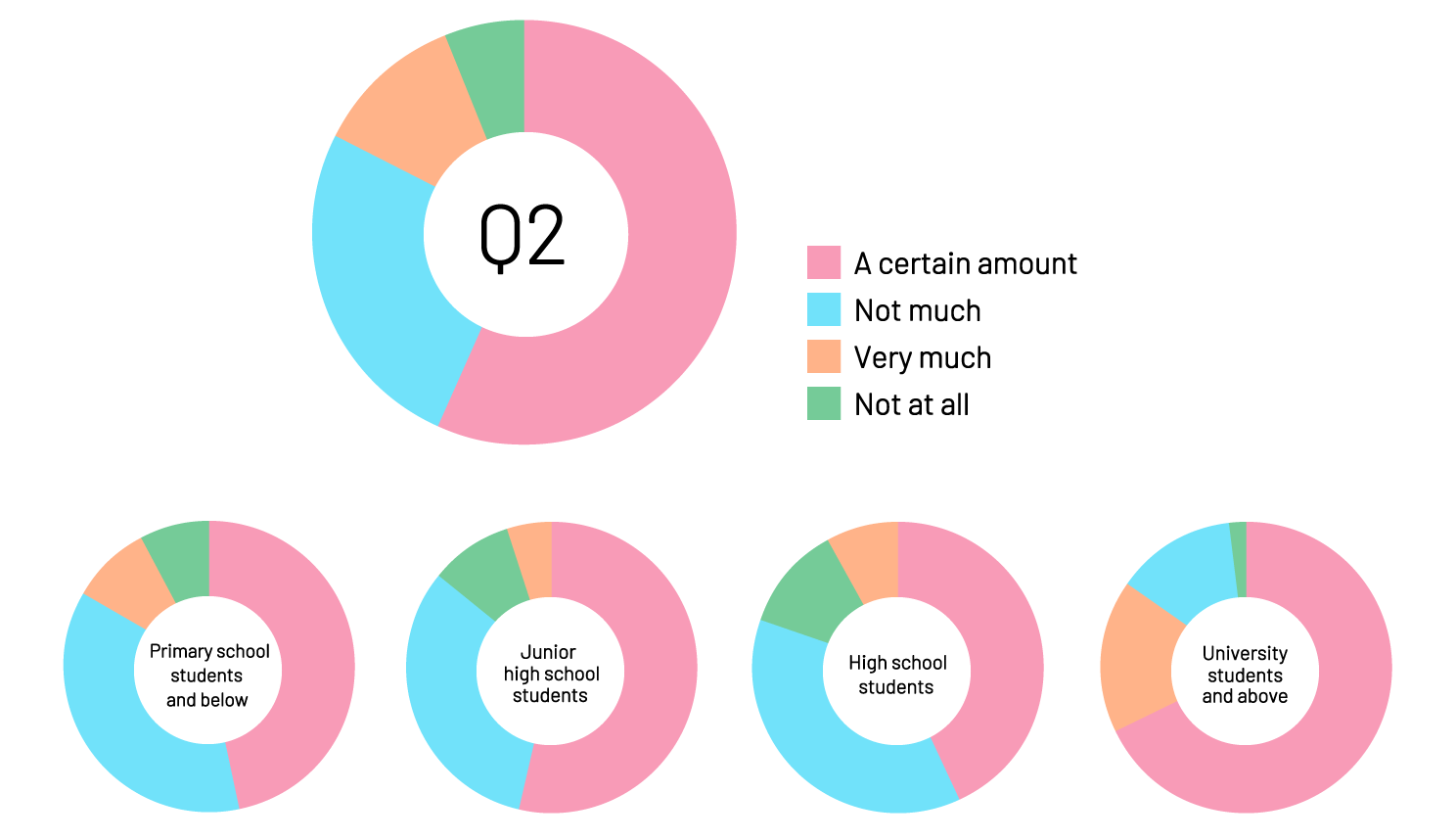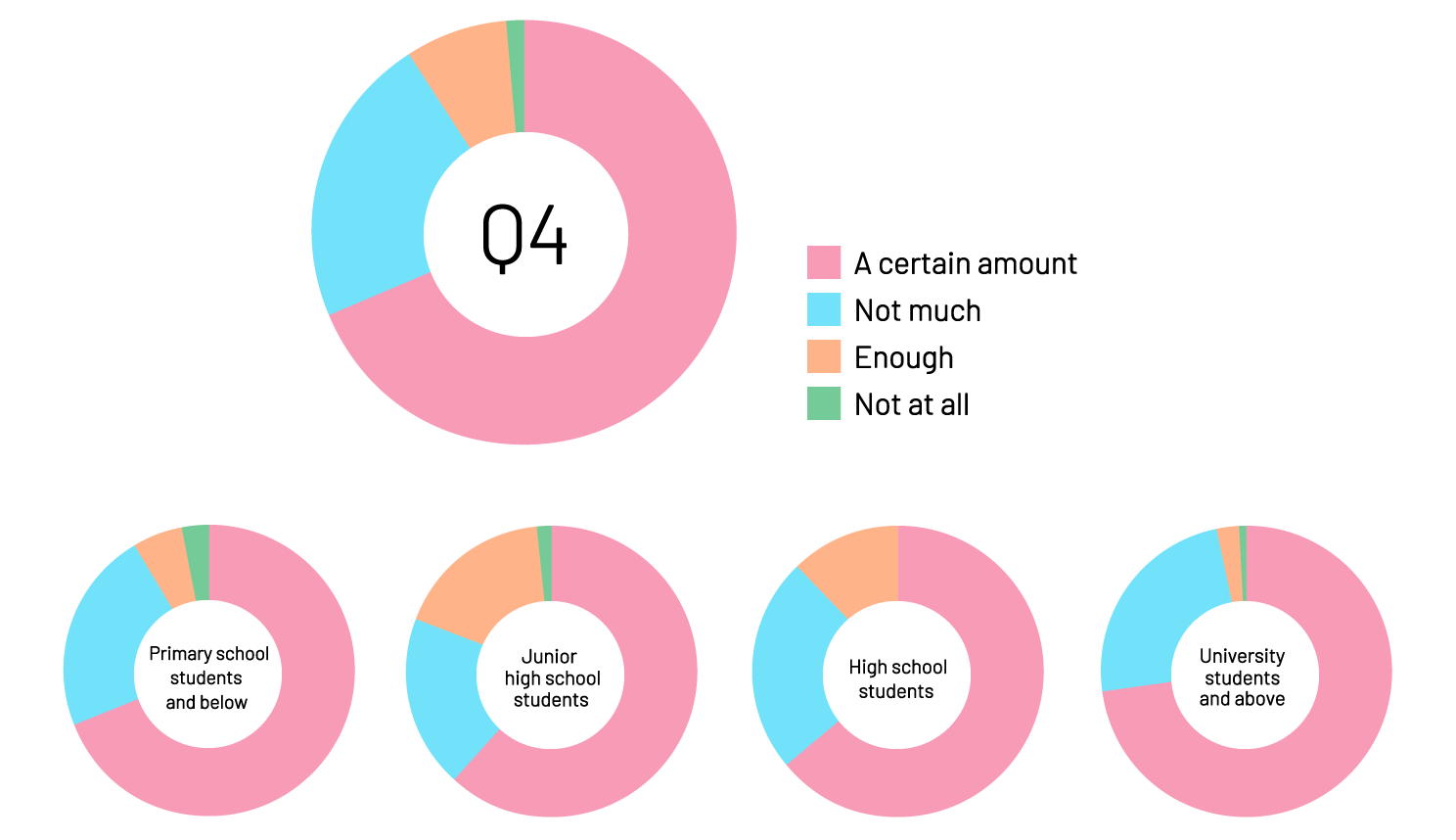Survey
Outline
We conducted a survey of visitors to our school's cultural festival to determine the level of awareness of the Convention on the Rights of the Child. We also discussed the results of the survey.
*We conducted the survey after taking all possible measures against coronavirus infection.
Survey period: November 12, 2022 - November 13, 2022
Method: Written format
Respondent Details
Age: Primary school students and below (122) / Junior high school students (82) / High school students (65) / University students and above (162)
Gender: Male (238) / Female (155) / Others (5)

Questions we asked
【Q1】Are you familiar with the Convention on the Rights of the Child? (Select one)
I am familiar with its contents, I know a little about its contents, I know its name, I don't know it.
【Q2】Are you interested in social issues involving children's rights? (Select one)
Very much, a certain amount, not much, not at all
【Q3】Please tick all boxes that you think are correct regarding children's rights. (Select one / Multiple choice)
□ a. Children, like adults, are human beings who must be respected for their human rights and personalities.
□ b. Children's survival and development must be ensured to the maximum extent possible.
□ c. Children have the right to play and rest.
□ d. Children's rights are not the same as the rights of others. Children's rights are recognized only when they themselves fulfill their responsibilities.
□ e. Children must be free to express his or her own opinions.
□ f. Children have freedom of thought, conscience and religion.
□ g. Children have the right to access to medical care, insurance services and social security.
【Q4】Do you think that children's rights are fully respected in today's Japanese society? (Select one)
Enough, A certain amount, Not very much, Not at all
【Q5】Do you think there are cases in today's Japanese society where children's rights are not protected? If so, what are they? (Written answers)
【Q6】Are there any recent incidents/news related to Q5 that have left a strong impression on you? (Written answers)
【Q7】What would you like to see in the country, community, schools, family, etc. to help children lead a better life? (Written answers)
Result
【Q1】Are you familiar with the Convention on the Rights of the Child?
I know its name (134) / I don't know (105) / I know a little about its contents (88) / I am familiar with its contents (14)

【Q2】Are you interested in social issues involving children's rights?
A certain amount (191) / Not much (87) / Very much (38) / Not at all (20)

【Q3】Please tick all boxes that you think are correct regarding children's rights.

【Q4】Do you think that children's rights are fully respected in today's Japanese society?
A certain amount (218) / Not much (71) / Enough (24) / Not at all (4)

【Q5】Do you think there are cases in today's Japanese society where children's rights are not protected? If so, what are they?
〈Written answers (Total number of responses: 126)〉
・Second generation problems in the Unification Church
・Violence, neglect, and other forms of abuse and young carers
・Freedom of thought and religion
・System of entrance examinations
・Educational and economic gap
・Parents' knowledge and attitudes influence their children's education
・Children have few opportunities to communicate independently
・Children cannot go to school due to coronavirus
・Abortion of babies
・Not enough food
・Nothing
【Q6】Are there any recent incidents/news related to Q5 that have left a strong impression on you?
〈Written answers (Total number of responses: 102)〉
・Child abuse
・War in the Ukraine
・Second generation religious problem
・Young carers
・Poverty of single mothers
・Lost child deaths
・Children on waiting lists
・Child suicide
・Buses leaving children inside
【Q7】What would you like to see in the country, community, schools, family, etc. to help children lead a better life?
〈Written answers (Total number of responses: 123)〉
・To keep up with the current situation, such as schools knowing about families, etc. (Improvement of the system, policies and social structure that prioritize children, and creating a common social awareness that children are to be raised not only by families but also by society as a whole).
・It would be nice if the system to reduce tuition and medical expenses could be strengthened.
・I think it is important to communicate not only with parents and family members but also with the community and society as a whole, to provide information on places to consult, and to have opportunities to know from an early age that one's life is a choice to be made by oneself. I just want them to be treated in a way that they feel they don't have to hesitate to rely on adults.
Overall
In【Q1】, we surveyed awareness of the Convention on the Rights of the Child. More than 30% of the respondents answered that they “do not know” about the Convention, and less than 5% answered that they were “familiar with its contents.” Many people know the name of the Convention and are by no means unaware of it, but even those who answered that they were “familiar with its contents” did not select the correct option when viewed in conjunction with【Q3】, and many did not have a sufficient understanding of children's rights. From these results, it can be said that the Convention on the Rights of the Child has not penetrated society, and that a correct understanding of the rights of the child itself has not taken root.
In【Q2】, more than half of the respondents expressed interest in children's rights, and from an overall perspective, it can be said that people are interested in children's rights. However, since about 30% of the respondents answered "not very interested or not interested," it is also true that there are a certain number of people who are not very interested or not interested in children's rights.
In【Q3】, a low percentage of respondents appeared to know that children have the right to play and freedom of thought, conscience, and religion guaranteed. This is an important factor to improve the understanding of children's rights in the future, but what appeared even more striking, was that those who were not very interested tended to answer Q3 very low in the percentage of correct answers. This is a group of people who do not have a good understanding of children's rights and have little interest in them. One of the issues we need to overcome is how to make people in this group, which is not a small number, aware of the current situation. In Q6, most of the respondents related their answers to issues that are often covered in the news, such as the “second generation religious issue” and “leaving children on the bus.” This means that even those who responded that they are not interested in the issue understand that the social issues currently occurring are against the rights of children. It is believed that the number of respondents who are interested in the issue will gradually increase as more and more cases that violate children's rights, such as those mentioned above, are taken up by online news in the future.
In【Q4】, almost all respondents answered that “children's rights are respected to a certain amount” in Japanese society. The next highest percentage of respondents answered that “children's rights are not respected very much,” indicating that children's rights are not perfectly respected in Japan and that there is still room for improvement.
In【Q5 / Q6】, we surveyed the “lack of protection of children's rights in Japanese society” using a written form. Common to [Q5 / 6] were responses such as “second-generation religious issues,” “abuse,” “educational and economic gaps,” and “rights are undermined by parents (adults).” A number of other responses used terms such as “neglect” and “young carer,” as well as concrete responses such as “coronavirus” and “examination system,” which are not often discussed in places where children's rights are discussed.
When we go a little further and observe the results, there are a few things that can be seen by comparing the responses by age group. In【Q1】, more than 20% of respondents from junior high school students to university students and above answered “I don't know,” while elementary school students answered “I don't know” at around 50%, indicating that the opportunity to learn about children's rights increases the most among junior high school students. In addition, while the percentages of responses from elementary school students and younger to high school students in【Q2】 were similar, more college students and above responded “a certain amount” and fewer responded “not much.” From【Q1 / Q2】, college students and above have the highest level of awareness and interest in the Convention on the Rights of the Child, indicating that making them aware of the Convention is effective in getting them to think about various issues related to the rights of the child.
In the responses to【Q5】, there were significant differences by age group. Elementary school students and younger were more likely to answer about “leaving children on buses,” junior high school students answered “leaving children on buses” and “abuse,” high school students answered “abuse" and “second-generation religious issues,” and college students and older responded “second-generation religious issues,” showing a transition in the content of their answers. From this, it can be inferred that problems that can happen to one's immediate surroundings tend to leave a lasting impression, and we thought that themes that can happen to junior high and high school students, such as “abuse,” would be effective for this site, which is primarily targeted at junior high and high school students.
Impression
By taking the survey, we were able to clarify how people around were perceiving the issue of children's rights, and it was a good opportunity to consider how we could approach the issue to get more people interested and concerned about it. In addition to analyzing interest and concern, we were also able to visually see how children's rights are viewed from various perspectives.
Summary
- The level of understanding of children's rights is still low and not fully penetrated into society, and the system to respect children's rights is still developing in Japan.
- Even those who have no interest or concern are exposed to the issue of children's rights through social issues.
- Making people aware of the Convention on the Rights of the Child is a great opportunity for them to think about children's rights.
- Issues related to children's rights that may occur close to them are particularly likely to leave a strong impression on them.